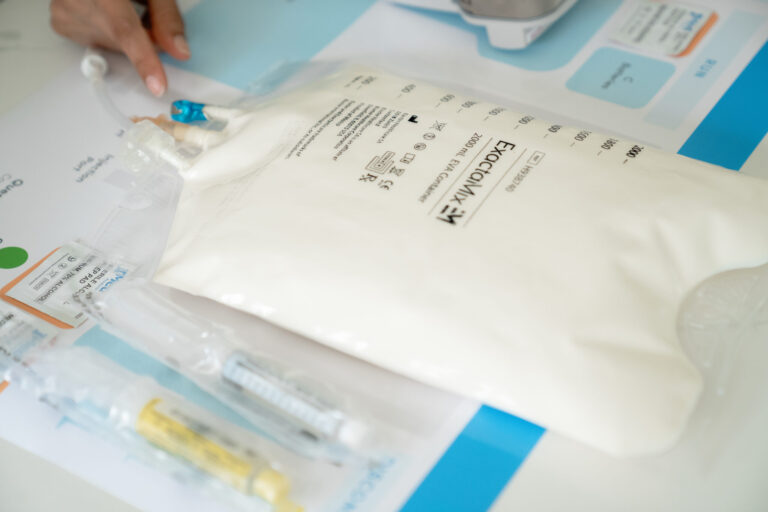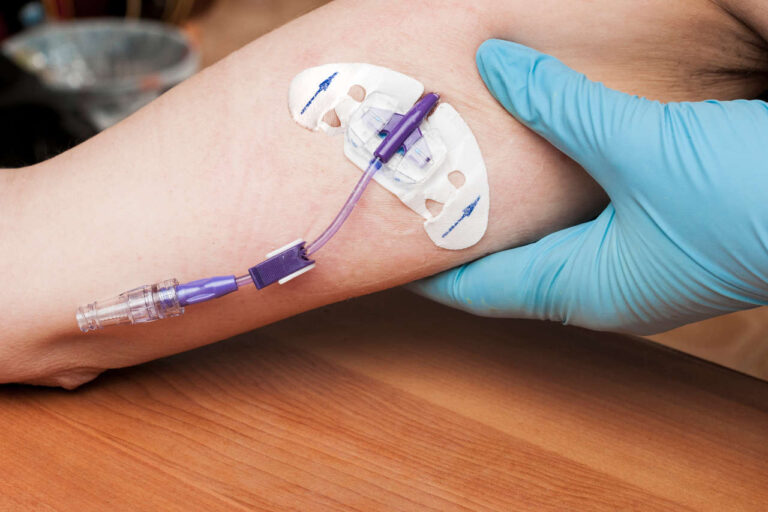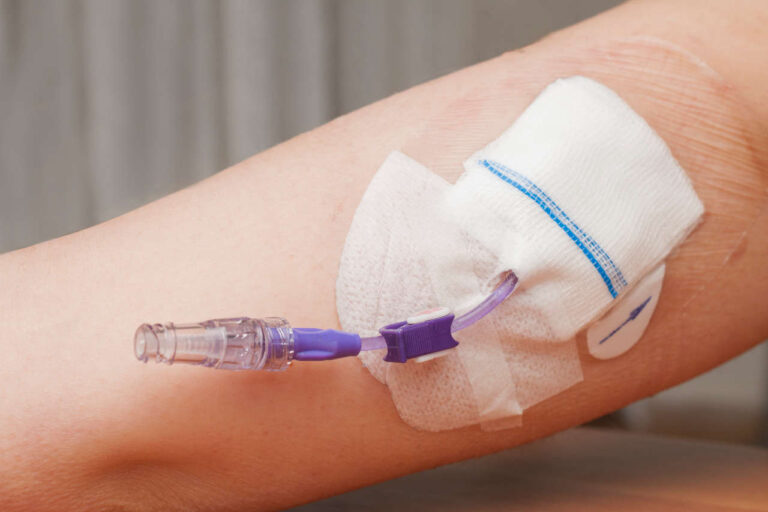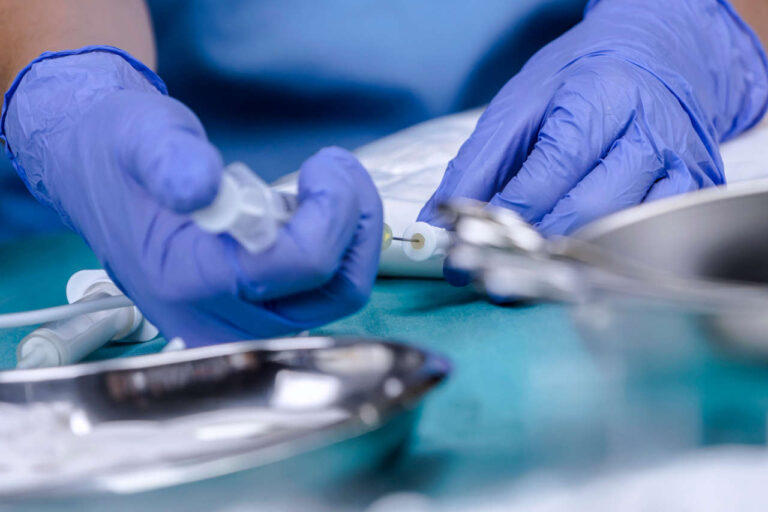
Việc chăm sóc sức khỏe và cung cấp dinh dưỡng đúng cách cho trẻ sơ sinh là vô cùng quan trọng vì trẻ đang trong giai đoạn chuyển tiếp. Hơn nữa, trong giai đoạn tăng trưởng và phát triển này, sức khỏe của trẻ sơ sinh có thể thay đổi bất thường. Cần phải xử lý ngay các vấn đề sức khỏe của trẻ sơ sinh bằng cách theo dõi và cung cấp dinh dưỡng hợp lý để tránh những tổn thương không thể phục hồi cho sức khỏe của trẻ.
Dịch truyền tĩnh mạch của bạn, luôn có sẵn
Hàng tồn kho đầy đủ, truy cập dễ dàngDinh dưỡng kém là nguyên nhân gây ra 3,1 triệu ca tử vong ở trẻ em trên toàn cầu mỗi năm, trong đó gần một nửa số ca tử vong xảy ra ở trẻ em dưới 5 tuổi. Dinh dưỡng qua đường tĩnh mạch toàn phần, viết tắt là TPN, đóng vai trò quan trọng trong việc đảm bảo sự phát triển và nuôi dưỡng trẻ sơ sinh bị suy dinh dưỡng, bệnh nặng hoặc không thể hấp thụ dinh dưỡng cần thiết qua đường miệng.
Cung cấp và theo dõi dinh dưỡng đầy đủ là quan trọng đối với trẻ sơ sinh và trẻ em vì suy dinh dưỡng có thể dẫn đến các tình trạng hoặc rối loạn suốt đời. Ví dụ, vào năm 2022, cứ 5 trẻ em dưới 5 tuổi trên toàn thế giới thì có hơn 1 trẻ bị còi cọc do suy dinh dưỡng. Trong bài viết này, chúng tôi sẽ thảo luận về TPN cho trẻ sơ sinh, cách sử dụng TPN cho trẻ sơ sinh và những trường hợp thường được chỉ định sử dụng TPN.
TPN là gì?
TPN, còn được gọi là dinh dưỡng hoàn toàn qua đường tĩnh mạch, là phương pháp cung cấp dinh dưỡng hoàn chỉnh qua đường lỏng. Phương pháp này được thực hiện qua đường tĩnh mạch (IV) cho trẻ sơ sinh, trẻ em, người lớn hoặc người cao tuổi không thể ăn uống qua đường miệng do bệnh lý hoặc do đường tiêu hóa không hoạt động.
Những người không thể sử dụng hệ tiêu hóa để hấp thụ hoặc tiêu hóa thức ăn do bất kỳ bệnh lý nào sẽ được cung cấp dinh dưỡng qua đường tĩnh mạch thông qua ống thông tĩnh mạch. Việc cung cấp dinh dưỡng qua đường tĩnh mạch (IV) sẽ bỏ qua toàn bộ hệ tiêu hóa từ miệng đến hậu môn và đi thẳng vào máu.
Các loại dinh dưỡng qua đường tĩnh mạch
Có hai loại của dinh dưỡng qua đường tiêm:
- Dinh dưỡng ngoài đường tiêu hóa một phần (PPN)
- Dinh dưỡng qua đường tĩnh mạch hoàn toàn (TPN)
Dinh dưỡng ngoài đường tiêu hóa một phần được cung cấp cho những bệnh nhân đã ăn một phần bữa ăn nhưng vẫn bị suy dinh dưỡng. Điều này có thể xảy ra do lượng thức ăn họ tiêu thụ không đủ hoặc không cung cấp đủ dinh dưỡng theo nhu cầu của cơ thể. Do đó, dinh dưỡng ngoài đường tiêu hóa một phần được cung cấp để bổ sung lượng calo hoặc dinh dưỡng bị thiếu hụt trong chế độ ăn uống của một người.
Mặt khác, như tên gọi của nó, dinh dưỡng qua đường tĩnh mạch hoàn toàn là nguồn cung cấp dinh dưỡng đầy đủ cho những bệnh nhân có hệ tiêu hóa bị suy yếu hoàn toàn hoặc không thể ăn uống.
Tại sao nên dùng TPN cho trẻ sơ sinh?

TPN có thể được dùng cho trẻ sơ sinh vì nhiều lý do, bao gồm:
Sinh non
Một trong những lý do phổ biến khiến TPN được sử dụng cho trẻ sơ sinh là do sinh non. Trẻ sơ sinh sinh non thường có hệ tiêu hóa kém phát triển Điều này ngăn cản khả năng hấp thụ và tiêu hóa thức ăn cũng như chất dinh dưỡng của trẻ. Việc sử dụng TPN cung cấp nguồn dinh dưỡng trực tiếp cần thiết cho sự tăng trưởng và phát triển của trẻ sinh non.
Lượng tiêu thụ qua đường miệng không đủ
TPN được sử dụng cho trẻ sơ sinh nếu trẻ không thể bú sữa mẹ qua đường miệng, làm giảm nguồn dinh dưỡng của trẻ. Việc bú sữa mẹ không đủ có thể xảy ra do một số tình trạng bệnh lý, chẳng hạn như phối hợp mút-nuốt yếu, suy hô hấp, v.v. TPN thường được sử dụng cho đến khi tình trạng bệnh lý được kiểm soát và khả năng bú sữa mẹ của trẻ sơ sinh được cải thiện.
Rối loạn tiêu hóa
Trẻ sơ sinh thường gặp các vấn đề về đường tiêu hóa như tiêu chảy, nôn mửa, khó tiêu hoặc các vấn đề về dạ dày, cản trở khả năng hấp thụ và tiêu hóa chất dinh dưỡng. Nếu tình trạng rối loạn tiêu hóa kéo dài, có thể cần bổ sung TPN để đảm bảo cung cấp đầy đủ chất dinh dưỡng.
Nguồn cung cấp sữa mẹ không đủ
Sữa mẹ là nguồn dinh dưỡng phong phú chính, đáp ứng nhu cầu dinh dưỡng của trẻ sơ sinh. Tuy nhiên, khi mẹ không thể sản xuất đủ sữa mẹ cần thiết cho nhu cầu dinh dưỡng của trẻ sơ sinh, TPN có thể được sử dụng như một nguồn dinh dưỡng bổ sung.
Ngoài ra, có thể thực hiện việc cung cấp sữa mẹ hoặc sữa công thức tiệt trùng cho trẻ sơ sinh và nỗ lực cải thiện nguồn cung cấp sữa mẹ.
Hỏi về máy truyền dịch tại nhà TPN
Dinh dưỡng sau phẫu thuật
Trẻ sơ sinh sinh ra với bất kỳ rối loạn, bất thường hoặc khiếm khuyết nào đều có thể phải trải qua các thủ thuật phẫu thuật phức tạp, như phẫu thuật bụng hoặc tim.
Phẫu thuật có thể hạn chế hoặc làm suy giảm tạm thời khả năng tiêu hóa hoặc ăn uống bằng đường miệng của trẻ. Do đó, nhu cầu dinh dưỡng của trẻ sơ sinh có thể được bổ sung thông qua nuôi dưỡng hoàn toàn qua đường tĩnh mạch.
Rối loạn chuyển hóa
Được thừa hưởng rối loạn chuyển hóa Trẻ sơ sinh có thể bị suy giảm khả năng chuyển hóa chất dinh dưỡng. Có thể sử dụng TPN tùy chỉnh, được thiết kế riêng để đáp ứng nhu cầu dinh dưỡng đặc biệt của trẻ và đảm bảo sự phát triển tối ưu trong một số liệu trình điều trị chuyển hóa nhất định.
TPN chứa những gì?
TPN là hỗn hợp dinh dưỡng hoàn chỉnh, bao gồm chất điện giải, chất dinh dưỡng đa lượng và vi lượng được thiết kế để đáp ứng nhu cầu dinh dưỡng cụ thể của trẻ sơ sinh.
Các các thành phần của TPN bao gồm:
- Vitamin và khoáng chất: Vitamin và khoáng chất rất cần thiết cho nhiều quá trình sinh lý trong cơ thể, như phản ứng enzym và hình thành xương.
- Chất điện giải: Chất điện giải duy trì sự cân bằng chất lỏng, chức năng cơ và dẫn truyền thần kinh.
- Protein: Axit amin và protein cần thiết cho sự phát triển và phục hồi mô.
- Glucose:Glucose là nguồn cung cấp carbohydrate giúp cung cấp năng lượng cho cơ thể đang phát triển của trẻ sơ sinh.
- Lipid: Lipid cung cấp các vitamin tan trong chất béo và axit béo thiết yếu cho sự phát triển của não bộ.
- Các nguyên tố vi lượng: TPN cũng chứa các nguyên tố vi lượng như selen, kẽm, đồng và các nguyên tố khác cần thiết để hỗ trợ các phản ứng enzym và chức năng trao đổi chất của cơ thể.
Quản lý TPN cho trẻ sơ sinh
Trước khi tiêm TPN cho trẻ sơ sinh, cần phải đánh giá kỹ lưỡng tình trạng sức khỏe và nhu cầu dinh dưỡng của trẻ.
Quyết định sử dụng TPN cho trẻ sơ sinh được đưa ra sau khi có sự hợp tác của toàn bộ nhóm chăm sóc sức khỏe, bao gồm bác sĩ sơ sinh, dược sĩ và chuyên gia dinh dưỡng nhi khoa.
Để đảm bảo an toàn và cung cấp dinh dưỡng tối ưu cho trẻ sơ sinh, cần lập kế hoạch, chuẩn bị và theo dõi phù hợp. Các bước tiêm TPN cho trẻ sơ sinh bao gồm:
Đánh giá
Như đã thảo luận, bước đầu tiên trước khi dùng TPN cho trẻ sơ sinh là đánh giá tình trạng sức khỏe và nhu cầu dinh dưỡng của trẻ dựa trên cân nặng, tuổi thai, kết quả xét nghiệm hoặc các xét nghiệm y tế khác.
Công thức
Các Dung dịch TPN được dược sĩ chuyên khoa chuẩn bị theo thành phần và nồng độ dinh dưỡng cần thiết và được quy định dựa trên nhu cầu của từng trẻ sơ sinh.
Nói chuyện với một chuyên gia
Về Trợ cấp đồng thanh toánChèn
Sau khi chuẩn bị TPN theo chỉ định, một ống thông được đưa vào tĩnh mạch lớn của trẻ sơ sinh để truyền TPN. Ống thông có thể được đưa vào tĩnh mạch rốn (bụng), tay, chân hoặc da đầu của trẻ sơ sinh. Sau đó, dung dịch dinh dưỡng được đưa vào ống thông, cho phép truyền trực tiếp chất dinh dưỡng vào máu của trẻ.
Giám sát
Để ngăn ngừa các biến chứng và nguy cơ liên quan đến nuôi dưỡng qua đường tĩnh mạch ở trẻ sơ sinh, việc theo dõi đúng cách trong và sau khi dùng TPN là rất quan trọng. Ví dụ, cần theo dõi các dấu hiệu sinh tồn của trẻ sơ sinh, như tình trạng điện giải, đường huyết và chức năng gan.













